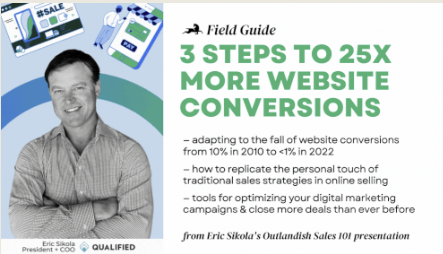3 steps to 25x more website conversions
Posted by: Team Outlander
Posted on 06/9/2022

Posted by: Team Outlander
Posted on 06/9/2022

The pandemic changed how we do business, pushing sales teams to adapt to new, more virtual-than-ever strategies for reaching customers. Before the pandemic, many companies nurtured leads in person through dinners, meetings, events, etc. Now, the #1 sales and marketing asset for your business is its website because, in a virtual-first world, your company’s website is your new storefront.
First, invest in your website early to set your sales team up for success. Aside from curbside appeal, your website must reflect your vision via engaging content that is easy to navigate and drives users to connect with you further.
However, a beautiful website alone won’t do the trick anymore.
Website conversions are down from 10% in 2010 to <1% in 2022. The pandemic expedited the shift to virtual-first shopping, which has impacted consumer activity, too. First, users are less willing to give up their personal information. Second, converting virtual leads poses unique challenges:
Response time is critical, but so is replicating the personal touch of traditional sales strategies. As with in-person sales strategies, you need to understand: Which user in the market to buy? How do we engage with each user in a personalized way? How do we meet users with buyer intent at the exact moment they want to talk to you?
The challenges of your virtual storefront will require tools for tracking prospects on and off your website.
You will drive potential customers to your website through a variety of marketing and sales campaigns, including paid ads, outbound sequences, SEO, review sites, social media, event promotions, and email marketing. Using UTM tracking tools, Google Analytics, or a pipeline generation tool like Qualified, you can track the highest-performing sources of inbound traffic and personalize subsequent marketing touchpoints to a greater degree.
For example, here’s how Qualified customers increase the >1% web conversion rate to +25% through their pipeline cloud:
Tracking user behaviors throughout your sales funnel will enable you to identify and assess bottlenecks or leaks hindering your conversion rates, such as willingness to pay, competitive price points, when users ghost reps, time from the first touchpoint to closed-won, customer sources, and more. Then, the next step in your sales playbook is segmenting your accounts, pricing, and packaging to create a repeatable, competitive funnel.

A strong sales strategy sets the foundation for every successful sales organization. Ideally, it should focus the team around a set of shared goals, enable the team to build trusted relationships with customers, and ultimately drive more pipeline and revenue. Nobody knows this better than Eric Sikola, President and Chief Operating Officer of Qualified.
With 20+ years of enterprise software and SaaS experience, Eric knows what works. Watch the replay of his Outlandish Sales 101 session for his tried-and-true selling strategies and best practices for startups so you can convert more leads than ever before.
This Field Guide is a synopsis of the first half of Eric Sikola’s 45-minute Outlandish Sales 101 presentation. Click here to view the entire presentation and audience Q&A, and access the deck!
For more expert advice on building and scaling your startup, check out our event library and Field Notes.

As we explore the unknown of each new investment, our Field Guides are where we document all that we learn along the way.
So, whether you’re actively raising, trying to break into VC, or interested in our game-changing portfolio, our Field Guide's got you covered.
Sign up now for exclusive access to funding opportunities, events/resources from our network of experts, updates from our portfolio, and more!